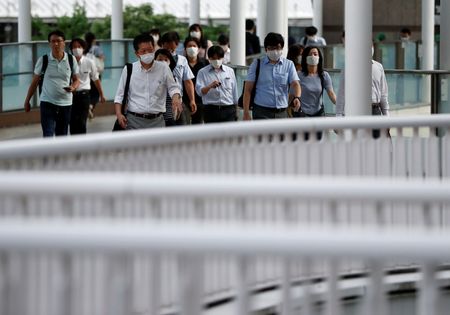By Tetsushi Kajimoto
TOKYO (Reuters) -Japan’s top firms have offered pay rises of around 2% or more as annual labour talks wrap up on Wednesday, a boost from last year’s razor-thin increase but still unlikely to kick-start demand in the moribund economy.
Prime Minister Fumio Kishida has piled pressure on profitable firms to raise pay by 3% or more as part of his drive to spread wealth more widely and boost consumer spending.
Low wages remain one of the most pressing problems for the world’s third-largest economy, where companies and households tend to hoard cash instead of spending thanks to years of deflation.
The annual wage increases by large firms set the tone for the rest of the economy and are therefore closely watched.
This year, analysts are focused on whether companies will raise pay by 2% or more.
Blue chip firms last year offered their lowest pay increases in eight years, at 1.86%.
However, economists say any boost for workers and the economy is likely to be offset by recent increases in fuel and food prices.
“Fiscal 2022 wage hikes will outpace the prior year to reach around 2%.
Still, our expectations for stronger pay rises are low due to weak earnings at domestic demand-led companies due to the COVID-19 curbs,” said UBS Securities economist Masamichi Adachi.
Kishida and Bank of Japan Governor Haruhiko Kuroda have stressed the need for wage hikes in achieving the 2% inflation target, with the premier calling for 3% wage hikes, which Adachi called “too ambitious.”
Automobile companies, which have strong influence on nationwide wage talks, have already agreed to meet their union demands in full, including Toyota Motor Corp and Honda Motor Co.
On Wednesday, major electrical machinery makers followed suit, with Hitachi Ltd and Toshiba Corp agreeing with their unions to raise pay by 2.6% and 2.5%, respectively, including a base pay rise of 3,000 yen ($25.36).
Chief Cabinet Secretary Hirokazu Matsuno vowed on Wednesday that the government will create an atmosphere by “mobilising all possible measures” in order for companies to raise wages.
“What’s important is to realise wage hikes firmly under the circumstances where prices are rising,” he told reporters.
The Rengo trade union confederation has gone so far as to call for a 4% increase.
But, as ever, Japanese firms remain cautious.
While corporate Japan is sitting on a record $2.8 trillion in cash and deposits, managers point to the Ukraine crisis, spiking oil prices, a weakening yen and the COVID-19 pandemic as reasons to save money.
“If the Ukraine crisis hit corporate earnings hard, it would prompt firms to slash bonuses, putting a lid on wages,” said Yoshiki Shinke, chief economist at Dai-ichi Life Research Institute.
“It is difficult to assume the shunto wage hikes will help boost private consumption.”
Last year’s pay rises were hampered by the pandemic, further complicating the central bank’s drive to see 2% sustainable inflation.
Some companies are shifting away from uniform wage hikes towards a more varied approach on remuneration.
More of them are adopting merit-based wages, rather than seniority-oriented pay, to lure skilled talent.
The move coincides with structural changes in the labour market. About 40% of workers consist of part-time staff and contract workers, double the proportion seen in 1990, many of whom do not belong to labour unions.
Improving working conditions and minimum wages for these low-paid “non-regular” workers are also a focus of the labour talks.
Apart from wages, labour productivity and work-style reform are topics that will likely be discussed.
Japan’s economic growth likely ground to a near halt this quarter as coronavirus curbs and supply disruptions threaten to derail the country’s economic recovery, a recent Reuters poll of economists showed.[ECILT/JP]
($1 = 118.3000 yen)
(Additional reporting by Shinji Kitamura; Editing by David Dolan, Jacqueline Wong and Kim Coghill)











